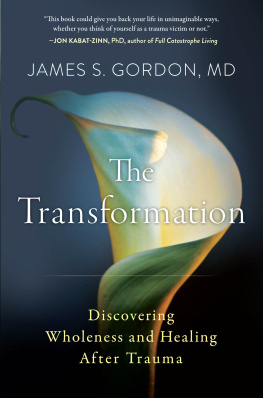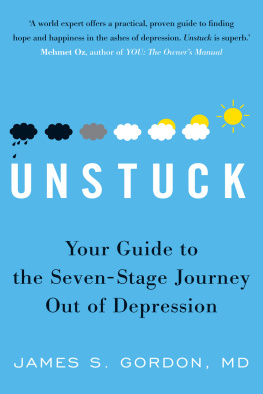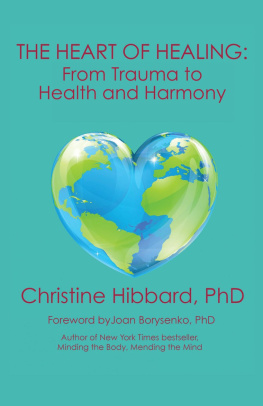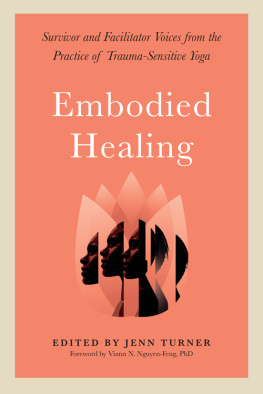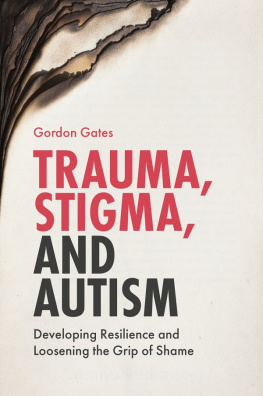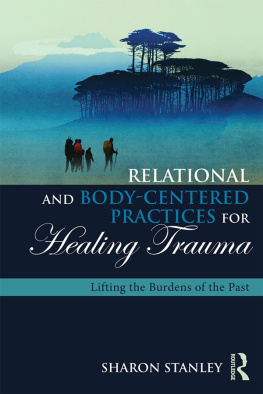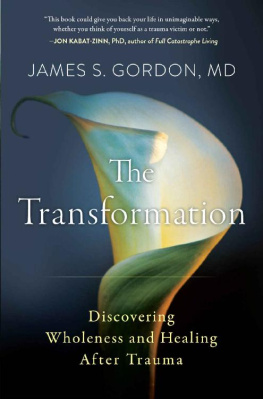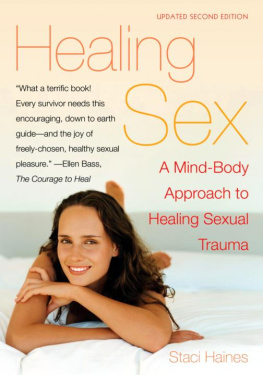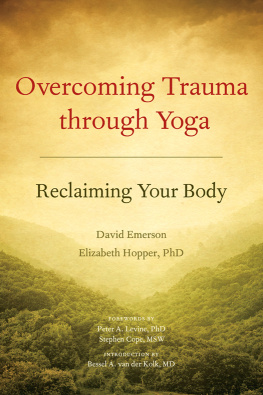T HERE ARE TWO common and dangerous misconceptions about psychological trauma.
The first is that trauma (the word is Greek and means injury) comes only to some of us: combatants or civilians in a war, victims of natural disasters, survivors of rape and incest, children whove grown up in the most callous and sordid families.
The second is that trauma is an unmitigated disaster, causing permanent emotional crippling, requiring never-ending treatment, severely limiting the lives of those whove experienced it.
IN FACT, TRAUMA COMES , sooner or later, to all of us. In a recent government survey, 60 percent of US adults said that as children they had experienced significant abuse and/or neglect. Studies of adverse childhood experiences (ACEs) in the 1990s reported that more than a quarter of the middle-class, well-educated, and financially secure Americans who were surveyed were as children often or very often hit... so hard that [they] had marks or were injured.
Having a life-threatening illness, a long-term disability, or chronic pain is traumatic. So is caring for someone with these conditions.
Poverty is traumatizing, and so are racism and gender discrimination.
Loss of a loving relationship is deeply traumatizing. So is the loss of a job that gave our lives meaning and purpose.
And all of us, if we live long enough, will have to contend with the trauma of losing loved ones, and with old age, physical frailty, and death.
Trauma comes to all of us, and its consequences can be terrible. Thats the truth and the bad news. The good news is that all of us can use tools of self-awareness and self-care to heal our trauma and, indeed, to become healthier and more whole than weve ever been. If we accept the pain that trauma inflicts, it can open our minds and bodies to healing change. If we relax with the chaos it brings, a new, more flexible, and more stable order can emerge. Our broken hearts can open with tender consideration and new love for others, as well as ourselves.
This is the timeless wisdom of the shamans, our planets oldest indigenous healers, and also of our great religious and spiritual traditions: suffering is the soil in which wisdom and compassion grow; it is the school from which we graduate, committed to healing others hurt. Recent scientific studies on post-traumatic growth yield similar conclusions.
This is what I know after fifty years of clinical work with traumatized people and from wrestling with and learning from the ordinary challenges and heartbreaking losses of my own long life. This is what I want to share with you, here, now, in The Transformation.
FIFTY YEARS AGO, as a resident in the emergency room of Jacobi, the Bronxs public hospital, I met Diana and began my trauma-healing work.
In medical school, Id learned to enter the inner world of troubled children and older people struggling with life-threatening illness and also to listen to my own confusion and troubles. I reached out for help to Robert Coles, a young psychiatrist at the Harvard Health Services, who was working with the Black kids who were braving murderous mobs to integrate New Orleans schools. Bob helped me learn for myself the lessons that Freud had taughthow early childhood trauma of loss and forgotten abuse had made me more vulnerable to present loss. He also set an example of personal vulnerability and courageous commitment, sharing with me his own pain and loss and showing me I could make a healing difference in the larger world as well as with individual patients. And Bob helped me begin to know who I was, to appreciate my identityan enduring sense of myself that has pulled me through troubled times.
While I was working as a student on medical and psychiatric wards, I was also welcoming other teachers who began to appearin books as well as in my life.
Early on, there was Mans Search for Meaning, a slim memoir by Viktor Frankl, an Austrian Jewish psychiatrist whom the Nazis had confined in concentration camps. In Auschwitz, in the midst of the most inhumane abuse and unimaginable suffering, Frankl had found the meaning and purpose of his life. Suffering ceases to be suffering, Frankl wrote, at the moment it finds a meaning. He found his in appreciating, understanding, and having compassion for his fellow inmates and himself. He realized, even while his wife was being condemned to death in another camp, that love is the ultimate good to which man can aspire. He learned to say yes to life in spite of everything. Reading Frankl, admiring him, I knew I wanted to do the same.
HELPING DIANA HEAL called on everything Boband books, medical school, and my internshiphad taught me and demanded a willingness to learn and take emotional chances I couldnt have imagined.
Diana arrived in the middle of the usual late-night chaos. She had a pixie face, chopped-off brown hair, and a compact body. She wore a pencil skirt and a Peter Pan blouse, and spoke in a wised-up Bronx way that mixed foul-mouthed street talk with offhand, spot-on psychological observation. Her medical chart was filled with dire diagnoses. Several psychiatrists had referred to a borderline personality disorder, another, multiple personalities; one suggested she was schizophrenic. She told me her current therapist was finishing his residency and that she was thinking of killing herself.
For the next two years, Diana and I met three or four times a week. I was her doctor, and she was my teacher. Every session was compelling, surprising, absorbing. I never knew who would appear in my office: a terrified eight-year-old; a snarling murderous version of her mother; a hip twenty-something; a helpless, thumb-sucking infant.
Dianas features seemed to change to fit the personality who was appearing. Her voice fell with whimpers and rose with screams and shouts. Sometimes she shrank into a corner and stared wildly, as if seeing her mothers ghost. Her severe trauma had apparently caused her self to fragment, to dissociate into different personalities that were unaware of one another. Freuds case histories were coming alive.
It became clear to me that Dianas diagnosis was far less important than the early, deep, and often repeated trauma that was responsible for her tortured ways. Over time I became aware of how childhood abuse shaped some of Dianas most disturbing and bewildering symptoms. I am garbage. I stink, she growled at me one afternoon more than a year into our therapy, as enraged as she was ashamed. My mother, she said between sobs and gasps, reliving it now, used to force my head into the garbage. She told me thats where I belonged.
Sometimes I was stunned by Dianas rageat my inattention or the least hint of less than honest words. Sometimes I was flat-out frightened by what she was going through and of what she might do to hurt herself. And in between one or another kind of fear and all my effort to understand her and what she was teaching me about myself as a therapist and as a person, I felt my heart opening, maybe more than it ever had, my arms reaching to hold close the terrified child, the whole person, who lived inside this divided, troubled, brave young woman.
Slowly, slowly, Diana became aware that present challengesher young childrens needs, her husbands anger and sexual demands, my upcoming vacationwere evoking, triggering, memories of the unmet needs, threatening rages, exploitation, and abandonment that had deformed her childhood.
As Diana shared and played out her past trauma with me, she seemed to grow taller, stand straighter. I felt safe with you. There was a me in there that was real, she told me years later. I was drowning and you were warm and solid. I felt accepted, more full. Finally me.

